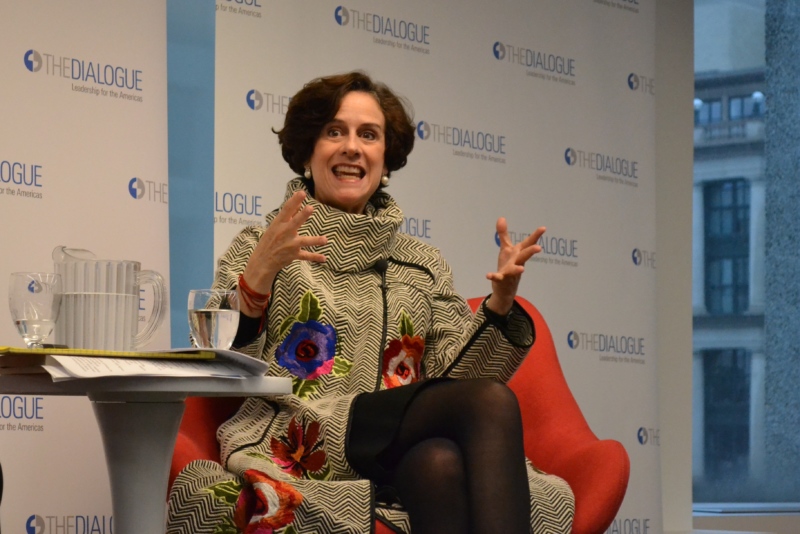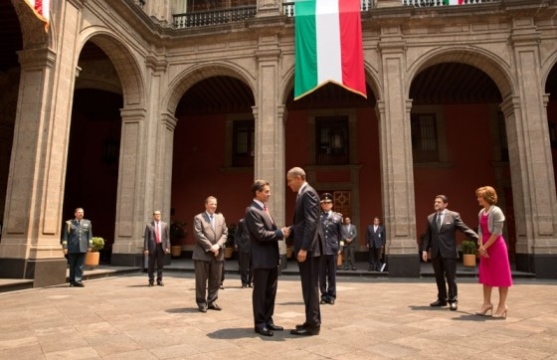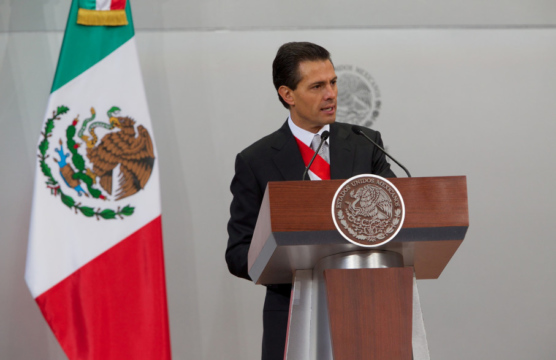Will the PRI Return to Mexico’s Presidency?
Does the Michoacán election portend a return of the PRI to the presidency next year?
On Thursday, May 11th, the Inter-American Dialogue hosted an event with Denise Dresser, professor of Political Science from the Instituto Tecnológico Autónomo de México. During the event: What’s Wrong with Mexico & How to Fix It, Dresser addressed the challenges the country is facing today such as the US-Mexico relations, Enrique Peña Nieto’s presidency, and corruption.
Dresser began her speech noting that President Enrique Peña Nieto has the lowest level of acceptance in Mexico’s history. She highlighted the PRI is losing its grip and, although it may win elections, it will do it with decreasing margins. It is an “era of political regression and social resistance,” she stated. Peña Nieto’s project of reforms was not enough to remodel and reconstruct the state. It was built upon corruption and took advantage of impunity. For Dresser, the reforms were top-down and did not search for “bottom-up consensus.” Moreover, in recent years there has been a grave increase in police corruption and extrajudicial killings, increase in corruption within the government, decrease in growth, increase in homicides, devaluation of the peso, increase in indebtedness reaching 50% of GDP, and increase instability. The prospects to change this situation, however, are poor. Dresser expressed that Peña Nieto is a failed president with a state unable to fulfill its main duties: stability, security, growth, human rights, and rule of law.
While @EPN's reform impulse was correct, in practice the reforms have been diluted and weakened -@DeniseDresserG #HowToFixMX pic.twitter.com/OWX5AwjwPt
— The Dialogue (@The_Dialogue) May 11, 2017
This impending crisis, Dresser stated, is not only Peña Nieto’s fault. Issues such as the drop in oil prices and the consequences of Trump’s presidency are external. Nevertheless, he is responsible for not spending in public investment. His administration mismanaged the economy, never fulfilling his promises to rationalize public spending. This generated widespread societal discontent and distrust that has constrained growth by undermining confidence in structural reforms, inequality, lack of accountability, concentration of wealth, and cronyism, which have become systemic problems.
According to Dresser, the root of the country’s issues is largely corruption. “Democracy in Mexico has not meant more controls but more corruption”, power rotation has exacerbated and normalized abuses. For her, democratization has led to the dispersion of power and the opening of more windows for corruption due to weak rule of law. Moreover, since Mexico does not have reelection, politicians are not held accountable, there is no punishment.
Dresser addressed the two frontrunners for the coming presidential elections: Margarita Zavala, the probable candidate for the National Action Party, and Andres Manuel Lopez Obrador (AMLO). Zavala, a respected woman, has not acknowledged or distanced herself from her husband’s mistakes. She has small proposals without little boldness and imagination. On the other hand, AMLO has reinvented himself to have a successful presidential bid.
Mexico is also facing external challenges. Trump an “autocrat who will empower himself” will misgovern the US with weakened checks and balances and a republican majority, said Dresser. He is unnecessarily turning allies into enemies. Free trade between Mexico and the US is in danger, the bilateral relation is threatened. She forecasts several possible results to his administration: a constitutional crisis, a confronted polarized society, a breakdown of international alliances, or an impeachment. Regardless of which, he will produce a “great deal of damage.”
"Corruption in Mexico is a mechanism of mutual protection" -@DeniseDresserG #HowToFixMX
— The Dialogue (@The_Dialogue) May 11, 2017
What can Mexico do? For Dresser, the current challenges should serve to incentivize a complete restructuring. The recent bottom-up national anti-corruption system that is being built is the first step to de-normalize corruption and will require autonomous prosecutors. An autonomous anticorruption prosecutor, an autonomous attorney general, a large enough budget, specialized tribunals, and persistent public pressure are required. The key areas to focus on: the future of the national anti-corruption system and the designations of those who occupy elite positions, the future of the attorney general’s office, the future of judicial reform, and the professionalization of the police. It is necessary to demand transparency in government spending, reduce party financing by 50%, fight corruption, create a rule of law that works for ordinary people, and a political class willing to reform itself.
“These aren’t times for providential saviors, conservative nationalist, proto-populists, or amiable wives.” The problems will not be automatically resolved by the next president. These are times for movements against the status quo emerging from civil society, said Dresser.
The event concluded with a question and answer section during which Dresser discussed, regional developments in anti-corruption, the role of civil society and its accountability, independent candidacies, NAFTA renegotiations, and security for activists and journalists, among others.
Watch the full recording of the event here:
Does the Michoacán election portend a return of the PRI to the presidency next year?
When President Obama meets this week with President Peña Nieto, he will be visiting a country that was much maligned throughout his first term.
Mexican President Enrique Peña Nieto marks 100 days in office. Is he focusing the beginning of his presidency on the right goals?
 Irene Estefanía González / Inter-American Dialogue
Irene Estefanía González / Inter-American Dialogue

